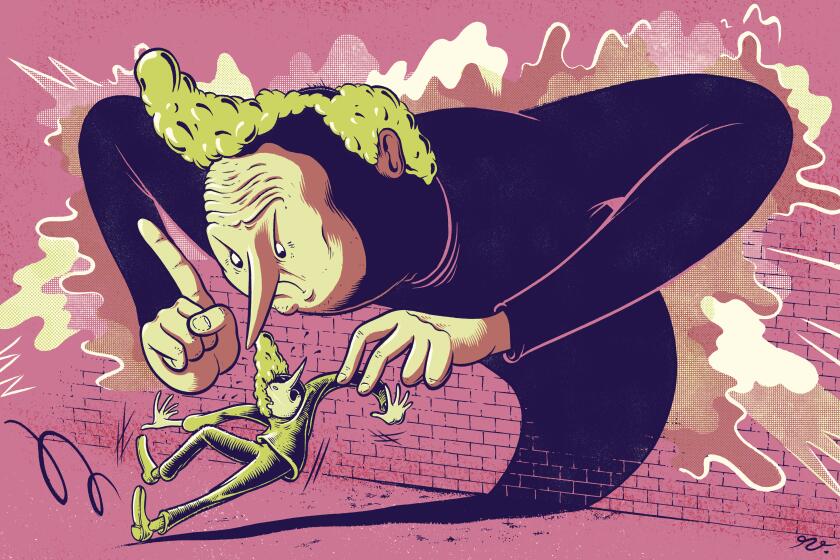For Alma Har’el and her first feature, ‘Honey Boy,’ the awards trail is an odd place to be
When Alma Har’el began working with Shia LaBeouf on the film that eventually became “Honey Boy,” she never expected to find herself knee-deep in the annual awards-season quagmire. At the time, LaBeouf was attempting to artistically express the difficulties in his life that stemmed from alcoholism and PTSD after an unconventional relationship with his father as a child actor.
After “Honey Boy” premiered to rave reviews at Sundance last January, Amazon Studios acquired the film and has diligently campaigned for Har’el, LaBeouf (who wrote and costars in the film) and stars Noah Jupe and Lucas Hedges over the past few months. That means there have been some good moments along the cross-country journey and some that can only be described as less than ideal.
After the Hollywood Foreign Press Assn. announced a slate of Golden Globe Award nominations that snubbed female directors and screenwriters last week, Har’el took to Twitter to respond to fans messaging her over their frustration at her omission. She thanked them and publicly noted, “I was on the inside for the first time this year. These are not our people and they do not represent us. Do not look for justice in the awards system.”
Only a few days earlier, Har’el was sitting in the lobby of a Beverly Hills hotel for yet another interview. It was clear the context of our conversation was foremost on her mind. Over a wide-ranging discussion that mostly centered on her narrative feature debut, the first subject she broached was, unexpectedly, the awards campaign itself.
“You wait for so long to make work that touches people and means something to people, and that has been the most exciting thing that ever happened to me in many ways,” Har’el says. “The awards part of it has been kind of like a satire of sorts, where you’re like one of the players but you didn’t know you were cast in it.
“And the more I dive into it, the more I realize that I’m living the legacy of Harvey Weinstein basically, because he really is the person that politicized award campaigns in the year of ‘Shakespeare in Love.’ And prior to that, there wasn’t so much of a political campaigning around awards as much as it is now. I feel like I’m on a political trail in many ways.”
Longtime industry observers might fiercely debate whether Oscar season wasn’t political or intense before Miramax broke onto the scene in the early ’90s, but there’s no disputing how integral it’s been over the past few decades in providing a revenue-generating platform for films that might not earn that particular spotlight otherwise.
Throw in the advent of streaming companies that are less concerned with box office than publicity-garnering accolades and Har’el finds herself in truly uncharted territory. She says there were other great offers to acquire the picture but Amazon promised to get behind the film in a “real way” and has kept its word.
“They weren’t just like, ‘OK, we’re going to release it for one week in two theaters and see what it does.’ They really saw some strength in it,” Har’el says. “The whole idea of a theatrical release is changing in general, not just in relation to awards. The way that young people are seeing stuff on their phone. They don’t really care that much necessarily, not all of them, if it is in a theater, or which streamer it is. It’s just like they hear about something they want to see, and they go and get it.”
Despite the jarring campaign, the Tel Aviv-born filmmaker has been most struck by the passionate fans of the film who have seen it three, four or five times and continue to post about it on social media. Har’el and Amazon asked for testimonies about why these moviegoers were seeing it so often and their answers genuinely surprised her.
“I guess what struck me about it is that certain people almost treated it like a meeting, like an anonymous meeting, because the topic and the things that are discussed are usually discussed in the rooms, you know?”
‘Rocketman,’ ‘Ad Astra,’ ‘Beautiful Day in the Neighborhood,’ ‘Waves’: Tangled father-son relationships will be the subject of films for years to come.
Har’el adds, “I mean, there’s a lot of addiction films that are very melodramatic, and this film covers topics like abuse and addiction, but [‘Honey Boy’] is from the perspective of the child of the addict and it does it thanks to Shia’s script and everybody in it and with some humor too. It’s really hard to put things like that out there. It’s just like you see films even when they are emotional, that the emotional path that they take, tonally, is usually safe.”
There is still a long way to go on this particular awards road for Har’el. She’s already nominated for a Film Independent Spirit Award as director and potentially a DGA Awards nominee. That being said, she’s taking a three-week “creative” break before the start of the new year to recharge. She’s developing other films and potential television projects but knows there is one key element for anything she commits to.
“The most important thing is, whatever I do, that it stays a little dangerous,” Har’el says. “That it’s not like the thing where you’re like, ‘Oh, here’s the biggest book ever written that everybody bought and the biggest superhero and now we’re going to jump on that train.’ You know? That’s not what I’m about to do.”
More to Read
Only good movies
Get the Indie Focus newsletter, Mark Olsen's weekly guide to the world of cinema.
You may occasionally receive promotional content from the Los Angeles Times.











